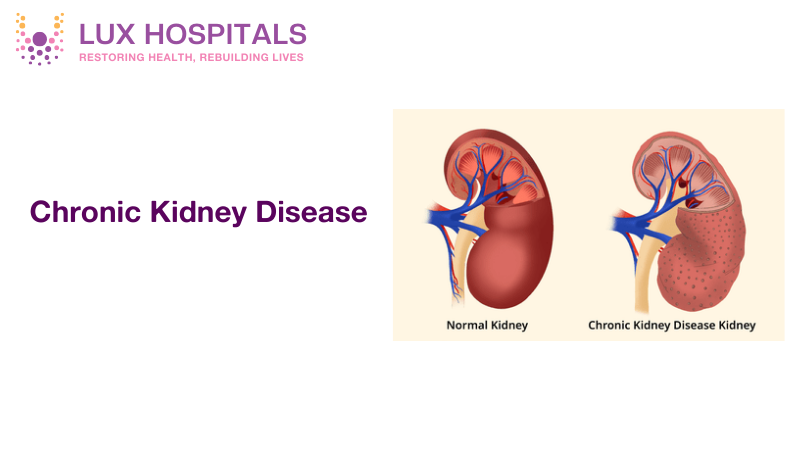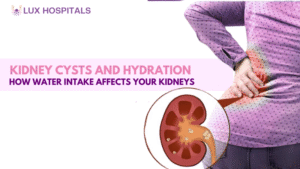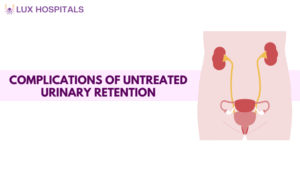How to Manage Chronic Kidney Disease: Tips for Maintaining Kidney Health

Chronic Kidney Disease (CKD) is a chronic illness in which the kidneys gradually deteriorate. It may develop throughout several phases of chronic renal disease, ultimately leading to kidney failure if not managed properly. Although chronic kidney disease cannot be reversed, it can be slowed down, and quality of life can be enhanced with early detection and appropriate treatment.
In this article, we will examine helpful methods for managing chronic renal disease and preserving kidney health.
Understanding Chronic Kidney Disease
The kidneys play a major role in controlling blood pressure, balancing electrolytes, and filtering waste. When the kidneys are injured and unable to operate at their best, chronic kidney disease occurs. High blood pressure, diabetes, and hereditary factors are common reasons.
Chronic Kidney Disease Stages
Based on kidney function as determined by the Glomerular Filtration Rate (GFR), chronic kidney disease (CKD) is divided into five stages:
- Stage 1: Kidney damage with normal GFR (>90 mL/min). Minimal symptoms.
- Stage 2: Mild decline in kidney function (60-89 mL/min).
- Stage 3: Moderate decline (30-59 mL/min). Some symptoms may appear.
- Stage 4: Severe decline (15-29 mL/min). High risk of complications.
- Stage 5: Kidney failure (<15 mL/min). Dialysis or transplant may be necessary.
Recognizing the stage of chronic kidney disease helps in choosing the right treatment approach.
Effective Management of Chronic Kidney Disease
CKD management includes lifestyle changes, dietary management and medical treatments.
1. Monitor Blood Pressure and Blood Sugar
The most common cause of CKD is Hypertension and Diabetes. Maintaining blood pressure below 130/80 mmHg and optimal blood sugar level prevents the further destruction of the kidneys.
- Follow the prescribed medications.
- Monitor the blood sugar levels.
- Reduce the salt intake to control blood pressure.
2. Follow a Kidney-Friendly Diet
Chronic renal disease is best managed with a well-balanced diet. Consider the following dietary tips:
Limit Sodium: High sodium intake increases blood pressure. Avoid processed foods and opt for fresh, home-cooked meals.
- Reduce Protein Intake: Excessive protein consumption can strain the kidneys. Lean protein sources like fish, eggs, and plant-based proteins are better options.
- Control Potassium and Phosphorus Levels: Foods high in potassium (bananas, potatoes) and phosphorus (dairy products, nuts) should be limited to prevent mineral imbalances.
- Stay Hydrated: Adequate water intake helps flush out toxins but should be adjusted based on kidney function and doctor’s advice.
3. Maintain a Healthy Weight
The risk of diabetes and hypertension is increased by being overweight, which leads to CKD. Take up a moderate amount of exercise, like walking, cycling, or yoga to maintain a healthy weight.
4. Avoid Nephrotoxic Medications
Over-the-counter painkillers such as naproxen and ibuprofen can cause kidney damage. Before taking any drug, always get a prescription.
5. Quit Smoking and Limit Alcohol
Smoking speeds up damage to the kidneys by decreasing blood supply to them. Because it causes dehydration and increases blood pressure, alcohol can exacerbate chronic kidney disease (CKD).
6. Manage Stress and Get Enough Sleep
Stress and sleep deprivation can negatively impact kidney function. Getting 7-8 hours of sleep per night and using relaxation techniques like deep breathing and meditation will help you maintain your general health.
7. Regular Health Checkups
The health indicators, especially blood pressure and renal function, should be routinely monitored for early detection of any deterioration in kidney health. They are followed routinely, and nephrologists can ensure that patients receive appropriate care.
Tips for Maintaining Kidney Health
Even if you do not have CKD, adopting healthy habits can prevent kidney problems in the future. Here are some essential tips:
- Stay Hydrated: A healthy kidney and the removal of toxins are supported by enough water consumption.
- Eat a Balanced Diet: Include plenty of fruits, vegetables, and whole grains while limiting processed and high-sodium foods.
- Exercise Regularly: Physical activity helps control weight, blood pressure, and blood sugar, all of which benefit kidney health.
- Avoid Excessive Painkillers: Frequent use of NSAIDs like ibuprofen can harm kidney function over time.
- Limit Alcohol and Caffeine: Excessive consumption can lead to dehydration and increased blood pressure.
- Monitor Blood Pressure and Blood Sugar: High levels of both can strain the kidneys and increase disease risk.
- Reduce Stress: Chronic stress impacts overall health, including kidney function. Practice mindfulness, meditation, or other stress-reducing activities.
Medical Treatment for Chronic Kidney Disease
Medications
Medication may be prescribed by doctors to regulate blood pressure, blood sugar, and cholesterol levels. In some cases, erythropoietin-stimulating agents (ESA) are used to treat anemia related to CKD.
Dialysis and Kidney Transplant
In advanced chronic kidney disease stages, dialysis or a kidney transplant may be necessary. A transplant may provide a long-term cure, but dialysis eliminates waste and extra fluid from the body.
Conclusion
Although chronic kidney disease is a severe condition, its course can be slowed with early detection and the right treatment. A kidney-friendly lifestyle, taking medications as directed, and getting frequent examinations can help persons with CKD stay healthier and avoid complications. Consult a medical professional for advice and treatment if you suspect renal illness or have risk factors.
Frequently Asked Questions
Chronic Kidney Disease (CKD) is a long-term condition where the kidneys gradually lose function, leading to waste and fluid buildup in the body. It progresses through five stages and, if untreated, can result in kidney failure, requiring dialysis or a transplant.
The most common causes of CKD are diabetes, high blood pressure, kidney infections, and genetic conditions like polycystic kidney disease.
Chronic Kidney Disease (CKD) has no cure, but its progression can be slowed with proper management, including medication, lifestyle changes, and dietary modifications. In advanced stages, dialysis or a kidney transplant may be needed.
Early symptoms of CKD may include fatigue, swelling in the legs or ankles, frequent urination (especially at night), foamy urine, and high blood pressure.
Yes, CKD increases the risk of high blood pressure, heart disease, anemia, bone disease, and electrolyte imbalances.
Chronic Kidney Disease (CKD) affects the urinary system by reducing the kidneys’ ability to filter waste and excess fluids, leading to decreased urine output, foamy or dark urine, and increased risk of infections. In advanced stages, it can cause fluid retention and toxin buildup in the body.
Consult a doctor if you experience persistent swelling, changes in urination, unexplained fatigue, high blood pressure, or signs of kidney infection. At Lux Hospitals, we have experienced urologists to treat your problems with advanced diagnostic and treatment options.




















